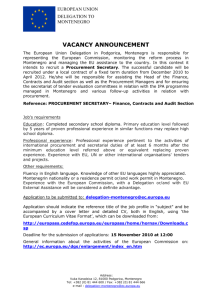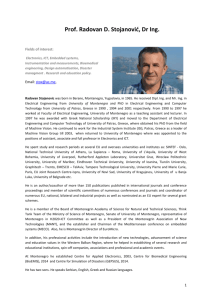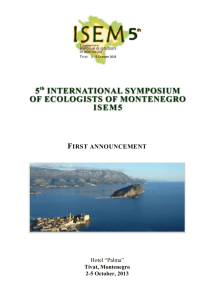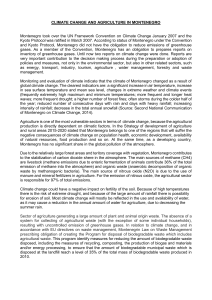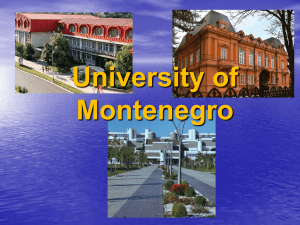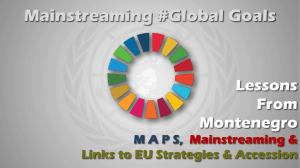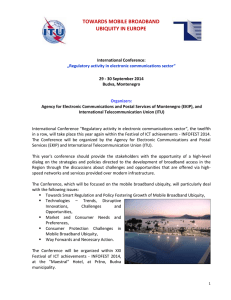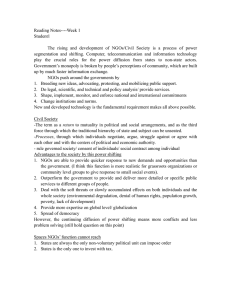Conference”Public financing of Civil Society Organisations in Montenegro” 10.-12. April 2014.
advertisement
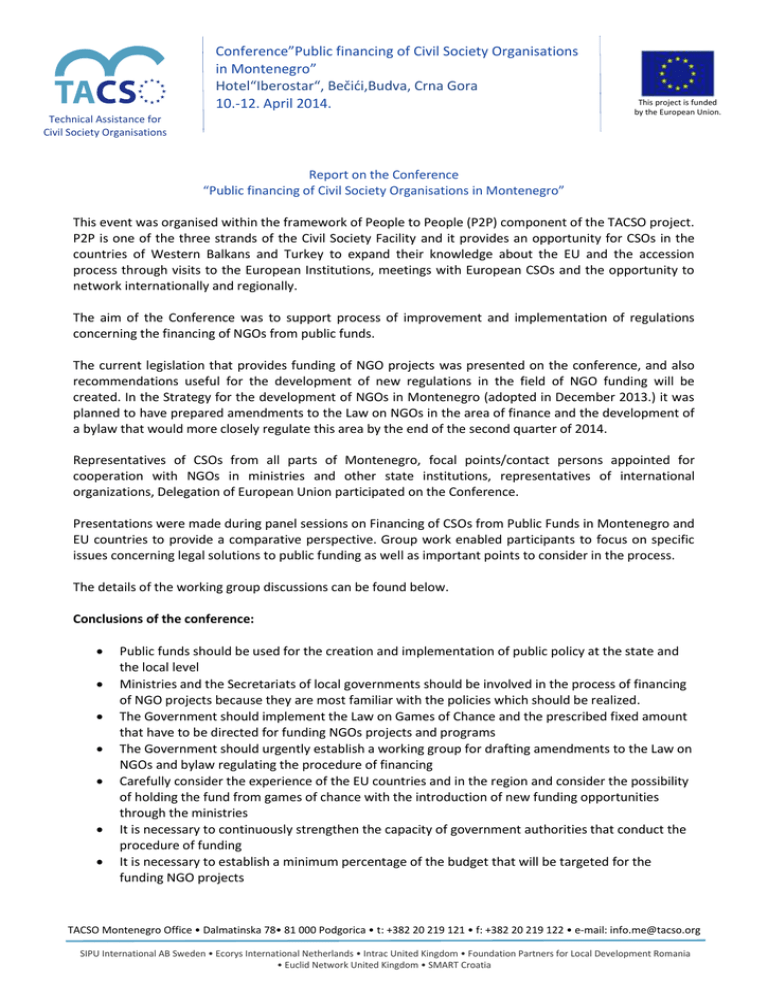
Conference”Public financing of Civil Society Organisations in Montenegro” Hotel“Iberostar“, Bečići,Budva, Crna Gora 10.-12. April 2014. Technical Assistance for Civil Society Organisations This project is funded by the European Union. Report on the Conference “Public financing of Civil Society Organisations in Montenegro” This event was organised within the framework of People to People (P2P) component of the TACSO project. P2P is one of the three strands of the Civil Society Facility and it provides an opportunity for CSOs in the countries of Western Balkans and Turkey to expand their knowledge about the EU and the accession process through visits to the European Institutions, meetings with European CSOs and the opportunity to network internationally and regionally. The aim of the Conference was to support process of improvement and implementation of regulations concerning the financing of NGOs from public funds. The current legislation that provides funding of NGO projects was presented on the conference, and also recommendations useful for the development of new regulations in the field of NGO funding will be created. In the Strategy for the development of NGOs in Montenegro (adopted in December 2013.) it was planned to have prepared amendments to the Law on NGOs in the area of finance and the development of a bylaw that would more closely regulate this area by the end of the second quarter of 2014. Representatives of CSOs from all parts of Montenegro, focal points/contact persons appointed for cooperation with NGOs in ministries and other state institutions, representatives of international organizations, Delegation of European Union participated on the Conference. Presentations were made during panel sessions on Financing of CSOs from Public Funds in Montenegro and EU countries to provide a comparative perspective. Group work enabled participants to focus on specific issues concerning legal solutions to public funding as well as important points to consider in the process. The details of the working group discussions can be found below. Conclusions of the conference: Public funds should be used for the creation and implementation of public policy at the state and the local level Ministries and the Secretariats of local governments should be involved in the process of financing of NGO projects because they are most familiar with the policies which should be realized. The Government should implement the Law on Games of Chance and the prescribed fixed amount that have to be directed for funding NGOs projects and programs The Government should urgently establish a working group for drafting amendments to the Law on NGOs and bylaw regulating the procedure of financing Carefully consider the experience of the EU countries and in the region and consider the possibility of holding the fund from games of chance with the introduction of new funding opportunities through the ministries It is necessary to continuously strengthen the capacity of government authorities that conduct the procedure of funding It is necessary to establish a minimum percentage of the budget that will be targeted for the funding NGO projects TACSO Montenegro Office • Dalmatinska 78• 81 000 Podgorica • t: +382 20 219 121 • f: +382 20 219 122 • e-mail: info.me@tacso.org SIPU International AB Sweden • Ecorys International Netherlands • Intrac United Kingdom • Foundation Partners for Local Development Romania • Euclid Network United Kingdom • SMART Croatia Conference”Public financing of Civil Society Organisations in Montenegro” Hotel“Iberostar“, Bečići,Budva, Crna Gora 10.-12. April 2014. Technical Assistance for Civil Society Organisations This project is funded by the European Union. Evaluation of projects should be done by independent experts who were not involved in NGOs and State administration. The Law on Local Self-Government should establish the percentage of the budget that will be aimed for the funding NGO projects It is necessary to improve the model of decisions on funding of NGO projects It is necessary to increase the transparency of the process (including project evaluation, explanatory process and evaluation ...) Monitoring, auditing and evaluation of the projects should be implemented in a professional manner Results of Group Work – Day I Group I - Legal solutions in financing NGO projects amendments to the Law on NGO) Support from the state Article 31 The state provides support to non-governmental organizations by providing funding to support the budget, as well by the introduction of taxes and other benefits to non-governmental organizations, in accordance with the law. COMMENTS: • After the state add "and local self-government" Financial support from the budget Article 32 The annual Law on Budget of Montenegro provides funds for projects and programs in the areas of public interest, carried out by NGOs. Areas referred to in paragraph 1 of this Article are considered: social and health care, poverty reduction, protection of persons with disabilities, social care for children and youth, assistance to the elderly, protection and promotion of human and minority rights, rule of law, civil society and volunteerism, Euro-Atlantic and European Integration of Montenegro, institutional and noninstitutional education, science, art, culture, technical culture, environment, agriculture and rural development, sustainable development, consumer protection, gender equality, the fight against corruption and organized crime, the fight against addiction as well as other areas of public interest stipulated by a special law. The project, in terms of this Act, is a set of activities in the areas referred to in paragraph 2 of this Article, which are implemented in a period that does not exceed one year. The program, in terms of this Act, is a long-term plan for the development of the organization and implementation of activities in the areas referred to in paragraph 2 of this Article for a period that does not exceed three years. TACSO Montenegro Office • Dalmatinska 78• 81 000 Podgorica • t: +382 20 219 121 • f: +382 20 219 122 • e-mail: info.me@tacso.org SIPU International AB Sweden • Ecorys International Netherlands • Intrac United Kingdom • Foundation Partners for Local Development Romania • Euclid Network United Kingdom • SMART Croatia Conference”Public financing of Civil Society Organisations in Montenegro” Hotel“Iberostar“, Bečići,Budva, Crna Gora 10.-12. April 2014. Technical Assistance for Civil Society Organisations This project is funded by the European Union. The Government of Montenegro (hereinafter: the Government) shall, at the proposal of the advisory body established by the Government, at the end of previous year, by a special act, identify priority areas of public interest referred to in paragraph 2 of this Article and the amount of funding for projects and programs in these areas. COMMENTS: • Given the time frame of the preparation process and the formulation of the budget, it seems too late for the Government to determine the priority areas by the expiration of the previous year (no later than the end of the second or third quarter); • It is necessary to define certain areas as a priority each year (disability rights) - a potential solution lies in the Slovenian model where funds from the National Lottery in a certain percentage allocated to the projects of disability organizations / Fund for professional rehabilitation and employment of persons with disabilities; • An alternative view: All areas should be treated in the same way • It is necessary to determine the percentage of the current budget that will be allocated for projects and programs of non-governmental organizations (1% of the current budget). In the case that all allocated funds are distributed, it is necessary to establish dedicated (reserve fund) from which the funds can be used in the allocation of funds for projects and programs of nongovernmental organizations in the next calendar year. Alternatively, Article 34 paragraph 2 of the law should predict that public tender is published no later than the end of the first quarter of this year (instead of the scheduled April 30 of the current year), and the possibility that, if a certain amount of funds remains undistributed, announce another call during the calendar year. Commission for the allocation of funds Article 33 The distribution of funds under Article 32, paragraph 1 of this Law shall be decided by the Commission for the allocation of funds to non-governmental organizations (hereinafter: the Commission), established by the Government. Members of the Commission are proposed by the state administration that are responsible for the areas referred to in Article 32, paragraph 2 of this Law, and non-governmental organizations whose goals and activities relate to these areas. Member of the Commission can not decide on the support of projects and programs by nongovernmental organizations in which he is employed, or has the capacity of legal representative or a member of the governing body or other body or non-governmental organizations with which it contracted. The Commission submits the annual report on its work to the Parliament of Montenegro until 31 March of the current year for the previous year; the report contains information about supported projects, the financial statements, the results of monitoring and evaluation. Composition, criteria for selection and nomination procedure members of the Commission, jurisdiction, the term of office and other issues of importance to the organization and work of the Commission are determined by an act on establishing the Commission. COMMENTS: TACSO Montenegro Office • Dalmatinska 78• 81 000 Podgorica • t: +382 20 219 121 • f: +382 20 219 122 • e-mail: info.me@tacso.org SIPU International AB Sweden • Ecorys International Netherlands • Intrac United Kingdom • Foundation Partners for Local Development Romania • Euclid Network United Kingdom • SMART Croatia Conference”Public financing of Civil Society Organisations in Montenegro” Hotel“Iberostar“, Bečići,Budva, Crna Gora 10.-12. April 2014. Technical Assistance for Civil Society Organisations This project is funded by the European Union. • The so-called Centralized model of financing created by the existing law on NGOs should be replaced so. combined model of centralized and decentralized models of financing. The centralization of the model would be reflected in the fact that the Government of Montenegro, at the proposal of the advisory body established by the Government determines priority areas of public interest and the amount of funding for projects and programs in these areas. Fragmentation of the model lies in the fact that the ministries lead the resource allocation process through its working bodies constituted of two representatives of the Ministry and an external evaluator. The criteria for the allocation of funds Article 35 Allocation of funds under Article 32, paragraph 1 of this law is applied through the following criteria: 1) contribution to the public interest in a particular area; 2) the capacity of the organization to implement the project, or program; 3) quality of the proposed project or program; 4) transparency of non-governmental organizations. A non-governmental organization that has received funding from the budget cannot in some other way receive funding in accordance with the law. Detailed criteria for the evaluation of projects and programs, and the forms of applications are regulated by the Government. COMMENTS Delete the phrase “A non-governmental organization that has received funding from the budget can not in some other way receive funding in accordance with the law. “ Allocation decision Article 36 The decision on the allocation of funds under Article 32 of this Law is published on the website of the Government and in all daily newspaper printed and distributed in Montenegro. The Commission signs with the NGO the contract on the use of funds, reporting and supervision of the implementation of the project or program for which the funds were allocated, within 30 days of publication of decision referred in paragraph 1 of this Article. The Commission submits to the advisory body referred to in Article 32, paragraph 5 of this law, once a year, a report on the implementation of projects and programs funded. Control of the designated use of funds allocated to NGOs is performed by external auditors hired by advisory body. Allocation decision Article 36 The decision on the allocation of funds under Article 32 of this Law is published on the website of the Government and in all daily newspaper printed and distributed in Montenegro. The Commission signs with the NGO the contract on the use of funds, reporting and supervision of the implementation of the project or program for which the funds were allocated, within 30 TACSO Montenegro Office • Dalmatinska 78• 81 000 Podgorica • t: +382 20 219 121 • f: +382 20 219 122 • e-mail: info.me@tacso.org SIPU International AB Sweden • Ecorys International Netherlands • Intrac United Kingdom • Foundation Partners for Local Development Romania • Euclid Network United Kingdom • SMART Croatia Conference”Public financing of Civil Society Organisations in Montenegro” Hotel“Iberostar“, Bečići,Budva, Crna Gora 10.-12. April 2014. Technical Assistance for Civil Society Organisations This project is funded by the European Union. days of publication of decision referred in paragraph 1 of this Article. The Commission submits to the advisory body referred to in Article 32, paragraph 5 of this law, once a year, a report on the implementation of projects and programs funded. Control of the designated use of funds allocated to NGOs is performed by external auditors hired by advisory body. COMMENTS: • Specify the term external auditors • Alternatively, the control of the designated use of the funds should be performed by the State Audit Institution (SAI). • It is necessary to define the amount of projects and programs to be audited, taking into account the cost of hiring external auditors to be proportional to the amount of the project to be controlled. • It is disputable why an advisory body needs to hire an external auditor for the Government or its competent authorities considering that the government by the Constitution and the law is responsible for proposing and implementing the budget. The publication of the report Article 37 A non-governmental organization that during the calendar year, at all grounds achieved revenue of more than EUR 10,000.00 is obliged to publish its annual financial report, approved by the competent authority of that organization, on its website within ten days of the adoption of the report. COMMENTS: • Instead of "on all grounds" put "from public funds" • Instead of "generated income higher than € 10 000" put "realized incomes" • Financial statements may be submitted to the Ministry of Interior that can be incorporated in the register of NGOs (according to the PADOR) or Tax Office that could publish them on its website • The issue of project co-financing from EU funds should also be treated by Law on NGOs. Group II: The procedure for allocation of funds for NGOs (bylaw) prioritization moderator-Goran Forbici PROBLEMS There is not always a clear picture of available resources and is therefore difficult to set priorities DESIRED STATE Clearly define the funds available for funding NGO projects as a first step in determining priorities TACSO Montenegro Office • Dalmatinska 78• 81 000 Podgorica • t: +382 20 219 121 • f: +382 20 219 122 • e-mail: info.me@tacso.org SIPU International AB Sweden • Ecorys International Netherlands • Intrac United Kingdom • Foundation Partners for Local Development Romania • Euclid Network United Kingdom • SMART Croatia Conference”Public financing of Civil Society Organisations in Montenegro” Hotel“Iberostar“, Bečići,Budva, Crna Gora 10.-12. April 2014. Technical Assistance for Civil Society Organisations There is no methodology for determining priorities (criteria) Time framework (deadlines) for establishing priorities has not been established (eg the last quarter of the next year) There is no participation of NGOs in the process of establishing priorities There is a lack of technical analysis that will help to determine priorities Cost-benefit analyzes are not done as the part of the process for establishing priorities This project is funded by the European Union. Establish a methodology for identifying priorities (criteria) Determine the time framework (deadline) for establishing priorities (eg last quarter of the next year) Ensure participation of NGOs in the process of establishing priorities Fund the production of professional findings that will become the basis for determining policies and priorities Ensure crearting of Cost-benefit analyzes as the part of the process for establishing priorities Public calls/tender PROBLEMS No existance of deadlines for launching of public calls Publication of calls in a small number of media In the public call and time by which applications must be submitted, time and date are not clearly defined Evaluation of projects PROBLEMS Short term for a quality evaluation of projects Insufficient capacities of the Commission to evaluate the proposals (technical review) Composition of the Commission is burdened by conflict of interest In many cases, there is no explanation of the reasons for the rejection of projects DESIRED STATE Strict compliance with the legal deadlines for scheduling of calls Expand the number of media in which the public calls are published Determine the time framework (deadline) for the submission of project proposals with clear date and time DESIRED STATE In the acts that regulate the deadlines for a decision on approved projects extend the deadline for a decision Provide the necessary conditions for the proper functioning of the Commission Composition of Commission should be free of conflicts of interest (professional references decisive factor, a public contest to choose evaluators of the projects) The website of the authority that issued a tender should include explanations for all the rejected projects (evaluation grids should be published on web station) Monitoring of projects PROBLEMS DESIRED STATE TACSO Montenegro Office • Dalmatinska 78• 81 000 Podgorica • t: +382 20 219 121 • f: +382 20 219 122 • e-mail: info.me@tacso.org SIPU International AB Sweden • Ecorys International Netherlands • Intrac United Kingdom • Foundation Partners for Local Development Romania • Euclid Network United Kingdom • SMART Croatia Conference”Public financing of Civil Society Organisations in Montenegro” Hotel“Iberostar“, Bečići,Budva, Crna Gora 10.-12. April 2014. Technical Assistance for Civil Society Organisations In almost all processes of public funding at the state level there is no monitoring of the implementation of approved projects even in situations where a implementer of such activities is known There is no sanctions for unscrupulous work of individuals or organizations that perform monitoring The audit of projects PROBLEMS Limited number of organizations that are subject to audit Assessment of the success of projects PROBLEMS In most cases there is no assesment of the success. This project is funded by the European Union. In the acts that regulate the deadlines for deciding on approved projects it is needed to extend the deadline for making a decision Acts that are regulating the process of monitoring implementation of approved projects should establish clear responsibility of individuals or organizations who implement monitoring Lack of expertise in carrying out this work There is no methodology by which the assessment of the success of projects should be done DESIRED STATE Provide greater coverage of the audit of organizations through acts that are regulating this issue DESIRED STATE Through acts that are regulating this issue is is needed to introduce a greater degree of responsibility for the nonimplementation of assessment of the success of projects .Assessment of the success has to be done by persons that have the skills and capacities to do the job. It’s clear that the neighbors or those who have made the decision on the allocation of funds should not participate in this process. Establish the methodology for assessing the success of projects through the Act which regulates the process of financing the projects of NGOs from public funds. Group III: The process of evaluating projects in the sub law Moderator-Ana Novaković PROBLEMS Composition of the Commission is burdened by conflict of interest and that is main issue DESIRED STATE Composition of Commission should be free of conflicts of interest (professional references decisive factor, a public contest to choose evaluators of the projects). It should be taken into consideration a proposal that evaluation commission for TACSO Montenegro Office • Dalmatinska 78• 81 000 Podgorica • t: +382 20 219 121 • f: +382 20 219 122 • e-mail: info.me@tacso.org SIPU International AB Sweden • Ecorys International Netherlands • Intrac United Kingdom • Foundation Partners for Local Development Romania • Euclid Network United Kingdom • SMART Croatia Conference”Public financing of Civil Society Organisations in Montenegro” Hotel“Iberostar“, Bečići,Budva, Crna Gora 10.-12. April 2014. Technical Assistance for Civil Society Organisations In the first phase of projects evaluation (administrative check) it is not possible to supplement the documentation. Does the lack of a technical document should eliminate a good project? Insufficient capacities of the Commission to evaluate the proposals (technical review) The criteria for evaluation of proposals are not disclosed in detail before the decision making process and known in advance CSO. Evaluators have a different understanding of the criteria. Short term for a quality evaluation of projects In many cases, there is no explanation of the reasons for the rejection of projects This project is funded by the European Union. the projects proposals have to include a representative of the related ministry (whose mission is to contribute to the assessment of the relevance of the project-connections of project proposal with the public policy). Any subsequent amendment documentation should be specified through the by-law. For less important documents have to allow the possibility of amendments within 48 hours or 72 hours. There is a possibility to create a unique database modeled similar to PADOR where evaluation commission can find all the important records of the NGO. In that case when CSO submitting a project proposal would be no need for the submission of technical (additional) documentation. Such databases need to be defined by law or by-law. Provide the necessary conditions for the proper functioning of the Commission All the details on how to perform evaluation should be published with the call for proposals. Because of the large difference in evaluators approach should be created a guide that will be used in the evaluation of projects. Guide should be defined through by-law. Evaluation table should to include the following criteria: relevance, capacity of the organization (financial, professional, technical), sustainability, target group, alignment of goals and activities. Needed to encourage partnership between less developed and more advanced CSO as well as CSO partnerships with the public sector. In the acts that regulate the deadlines for a decision on approved projects extend the deadline for a decision The website of the authority that issued a tender should include explanations for all the rejected projects (evaluation grids should be published on web station). This obligation should be defined through by- TACSO Montenegro Office • Dalmatinska 78• 81 000 Podgorica • t: +382 20 219 121 • f: +382 20 219 122 • e-mail: info.me@tacso.org SIPU International AB Sweden • Ecorys International Netherlands • Intrac United Kingdom • Foundation Partners for Local Development Romania • Euclid Network United Kingdom • SMART Croatia Conference”Public financing of Civil Society Organisations in Montenegro” Hotel“Iberostar“, Bečići,Budva, Crna Gora 10.-12. April 2014. Technical Assistance for Civil Society Organisations This project is funded by the European Union. law. Results of Group Work – Day II Group I: Legal solutions in financing NGO projects at the local level and decision on the criteria, methods and procedures for allocation of funds for NGOs 1. The Law The main topic of discussion was whether it is good solution to allocate 1% of the local governments’ budget. Also the question was whether we are speaking of total or current budget. Although there was general conclusion that it would be more convenient to speak about total budget, the general opinion was also that it would be more realistic to ask for 1% of the current budget. There was also suggestion that this should be prescribed by the Law on NGO. 2. Priorities There is a proposition coming from Union of Municipalities and it should be considered, but it should be adapted to the specific features of cities, in publishing public calls. Council for Cooperation with NGO on local level can be the body that can serve to conduct debate on the priorities. We agreed that, if there ought to be some priorities in the financing, it must be a result of discussions between representatives of local governments and NGO sector. Also, there was common opinion that good projects shouldn’t be rejected just because they are not belonging to the area which is high on the priority list for that year. This could be possible if there would be another category titled ‘’other’’ for which certain percentage of funds would be allocated. 3. Commission for project evaluation Even though the Union of Municipalities suggested formula 3+2+2, we believe that every municipality should decide on its own principle. Because not the same rules can apply to Podgorica and Savnik, for example. Maybe commission consisted of 3 members its suitable for Savnik, having in mind its size and the budget, and 7-members commission might be suitable for Podgorica. Commission members should be payed for their engagement in the Commission. Commission members must be experienced in writing and implementing of projects, as to be adequate to participate in the Commission work. That also applies for members which are representatives of NGOs. We did not discuss much on the process of choosing members which would represent NGO sector, but there is common opinion that there should be process of application and then evaluation based on previously defined criteria. TACSO Montenegro Office • Dalmatinska 78• 81 000 Podgorica • t: +382 20 219 121 • f: +382 20 219 122 • e-mail: info.me@tacso.org SIPU International AB Sweden • Ecorys International Netherlands • Intrac United Kingdom • Foundation Partners for Local Development Romania • Euclid Network United Kingdom • SMART Croatia Conference”Public financing of Civil Society Organisations in Montenegro” Hotel“Iberostar“, Bečići,Budva, Crna Gora 10.-12. April 2014. Technical Assistance for Civil Society Organisations This project is funded by the European Union. There is common attitude that NGOs whose representatives are in the Commission shouldn't candidate their projects. Some local governments can also, if they have competent staff, appoint those people as commission members, and not to use the form suggested by Union of Municipalities. The public call needs to be concrete and detailed as necessary so that there is no space for different interpretations. We didn't discuss much on the length of the term for commission members. Example from Niksic is that the term is 2 years and the first year has been 20122. But there were no public calls for that period, so there is a question whether their term is finished or not. If a commission has an NGO member, whose organization can't propose projects for that reason, then the term should be even shorter- one year. Commission has serious line of work including: defining rules for the public call, evaluating submitted proposals, explaining reasons for which some projects are rejected, preparation and adaptation of supported projects, preparing contracts, monitoring of project implementation , consultations with project implementers... 4. Public call for project proposals Precision, accuracy, unambiguous, clarity must be characteristic of the competition. The principle: There are no preferences. The same rules should be applied for all participants. The public call must be published 30 days after the adoption of the budget of the municipality. (If the budget is not adopted by the December 31st, than maybe public call can be published in accordance with the Decision on temporary financing, as not to wait for the Decision on adoption of the budget. ) If after all, there is need for some questions, then the question and the answer should be published online, so that everyone would be in the same position. We also spoke about the possibility of having two public calls during one year if all funds are not allocated in the first one. Very simple tool that is being used in Niksic is mailing list that serves as a source of all relevant information. 5. Decision on projects that are to be funded Accurately determine the criteria for project evaluation. Those who did not get the support for their project should get written explanation with scoring list. We do not have the proposed solution the question of possibilities to appeal on the decision. It is possible that Commission, during the procedure, asks for additional information, but only regarding technical matters. The content of project proposals cannot be modified. Time frame given for the technical interventions should be short (24 or 48 hours). These rules must be very clear in advance. First there will be eliminatory check and that there is creation of scoring list for all projects that passed eliminatory check. It must be decided what is the minimum amount the project can be supported with (we were talking about 50% of the project budget, but there were opinions that it should be 1000%). The scoring list in combination with the amounts planned to support certain projects will give the overall number of projects to be funded. We were also considering the practice of European Commission to negotiate with the project implementer on the proposed budget before signing the contract. Contracts need to contain clear rules about rights and obligations of the project implementer, starting and ending dates as well as reporting deadlines. 6. Monitoring TACSO Montenegro Office • Dalmatinska 78• 81 000 Podgorica • t: +382 20 219 121 • f: +382 20 219 122 • e-mail: info.me@tacso.org SIPU International AB Sweden • Ecorys International Netherlands • Intrac United Kingdom • Foundation Partners for Local Development Romania • Euclid Network United Kingdom • SMART Croatia Conference”Public financing of Civil Society Organisations in Montenegro” Hotel“Iberostar“, Bečići,Budva, Crna Gora 10.-12. April 2014. Technical Assistance for Civil Society Organisations This project is funded by the European Union. Commission members should monitor the project during the project implementation. Beneficiary of the financial support need to have the possibility to consult with commission members, during the project implementation in order to solve all dilemmas. All applicants must be familiar with the methodology of monitoring. Maybe good solution for choosing who will monitor which project would be to use draw. Written report should follow each monitoring visit. Good practice is that monitoring report is also sent to the beneficiary in case it has some comments. 7. Auditing Auditing should be done on all projects. We agreed that there should be certain percentage of funds intended for external audit. There is attitude that it can be done by employees in the Secretariat of finances. After the auditing has been conducted, it is possible to adopt a decision on restitution of part or total funds, or even prohibiting some organizations to candidate projects in the future. Also, there should be document stating on all the organizations that have done according to the rules in order to serve as proof or ‘’previous positive experience with the applicant’’ 8. Assessment of performance This is part that is being neglected very often. Our group considered that commission members should deal with the successfulness of the project that is whether project fulfilled its aims. This process needs to have clear methodology and it can not leave space for double interpretations. This is also important in future assessment of the organizations' capacities. There were certain comments that this approach can also serve to eliminate negative examples in the first few years, and after that it can be done based on the principle of random sample, not on all projects. Group II: Legal solutions in financing NGO projects at the local level and decision on the criteria, methods and procedures for allocation of funds for NGOs Legal basis: Law on Local Self-Government, Article 116, paragraph 2, item 5 Financing of NGO projects of interest to the local population, under the conditions and procedures prescribed by the general act of the municipality; Situation in practice: NGO representatives are generally unsatisfied with the way of financing NGOs on local level. Allocations to NGOs: Percentage and priorities: The percentage allocated to NGOs is not defined in the municipal budget, but is reduces or increased from year to year depending on the municipality. Allocations to NGOs are not constant, and the public competitions for project financing are not published regularly. TACSO Montenegro Office • Dalmatinska 78• 81 000 Podgorica • t: +382 20 219 121 • f: +382 20 219 122 • e-mail: info.me@tacso.org SIPU International AB Sweden • Ecorys International Netherlands • Intrac United Kingdom • Foundation Partners for Local Development Romania • Euclid Network United Kingdom • SMART Croatia Conference”Public financing of Civil Society Organisations in Montenegro” Hotel“Iberostar“, Bečići,Budva, Crna Gora 10.-12. April 2014. Technical Assistance for Civil Society Organisations This project is funded by the European Union. Models in defining the priorities in local governments are different, while in some municipalities, NGOs are not consulted when defining priorities. Status of NGOs is not equalized in some municipalities, that is- in some municipalities there are no clear criteria why some organizations are considered to be organizations of special public interest, and it often happens that those organizations automatically get the highest percentage of all the funds intended for NGOs. Sometimes, assets under discretionary powers are greater than funds that are allocated by competition. Commissions’ work: Evaluation Commissions do not respect The Decision and criteria during the process of evaluation. Commission members do not know or respect methodology. Criteria for election of commissions’ members from NGOs and local governments are not the same (there are prescribed criteria for NGO representatives, while there are no criteria for representatives of local governments) Commissions lack administrative capacities. Deadlines for project evaluations are generally short, especially in those municipalities where there is bigger number of applicants, which puts a shadow of a doubt of quality of evaluation process. Public calls and fund allocation Local governments are late with the payment of funds to CSOs whose projects were approved In some municipalities, CSOs can not appeal on the Decision or are not familiar with the ways and possibilities of complaints and appeals. There are no prescribed, standard application forms in some municipalities, but the application forms from other competition are being used. Therefore, NGOs are "forced" to find and compile the application form. In some municipalities, not all intended funds are actually being allocated and in those situations, other public call is not being announced, but the funds are being diverted for other purposes. In addition, in some municipalities, there are examples of poor and non-transparent practices, which are reflected in the fact that resources are allocated beside competition, by the unknown criteria and procedures. Project monitoring Monitoring of project implementation is being conducted only in the capital city- Podgorica, since 2003 and on the basis of free will by the members of Commission. (Therefore, there is no obligation that all Commission members monitor the process of project implementation) Project revisions are not being realized. TACSO Montenegro Office • Dalmatinska 78• 81 000 Podgorica • t: +382 20 219 121 • f: +382 20 219 122 • e-mail: info.me@tacso.org SIPU International AB Sweden • Ecorys International Netherlands • Intrac United Kingdom • Foundation Partners for Local Development Romania • Euclid Network United Kingdom • SMART Croatia Conference”Public financing of Civil Society Organisations in Montenegro” Hotel“Iberostar“, Bečići,Budva, Crna Gora 10.-12. April 2014. Technical Assistance for Civil Society Organisations This project is funded by the European Union. Suggestions for situation improvement: It is necessary to determine 1% of total budget of self government for the NGO projects. It is necessary to continuously announce public call for project proposals, and strictly comply with The Decision. In the third quarter of the year to prioritize the areas that will be financed in the next year, and it is necessary to expand the composition of the group that determines priorities (consult and involve NGOs in those municipalities which are not included) Contracts need to define the terms of disbursement of approved projects, and that deadline must be before the end of the budget year and the schedule of payments of the funds must follow the course of the project, or expenditure of funds. It is necessary to prescribe the opportunity to appeal the Decision and to introduce organizations with the possibilities and ways of appeal. It is necessary to strengthen the professional and administrative capacities of the commissions (through seminars, trainings, instruction ...) following the practices and measures of the Action Plan for the negotiation chapter 23 in the area of civil society. It is necessary to equalize the criteria for selection of members of the Commission from NGOs and from local government. Commissions should prescribe uniform application forms. The criteria in the evaluation of projects, and score sheets should be an integral part of the public announcement. It is necessary to create the legal conditions for the re-announcement of the competition, if all funds are not allocated by a previous call for proposals in the current year. It is necessary that all documentation which i an integral part of the competition: application form or a summary of the project, as well as the decision and the clarification to publish on the website of the local government or some other public media. It is necessary to prescribe longer time limits within which the Commission is to decide on project applications, depending on the size of the municipality, the number of NGOs and the amount of funds available, while the time limit may not be less than 30 days. Conduct regular monitoring and evaluation of the performance of all approved / supported NGO projects, and audits the project which is supported with more than € 10,000. TACSO Montenegro Office • Dalmatinska 78• 81 000 Podgorica • t: +382 20 219 121 • f: +382 20 219 122 • e-mail: info.me@tacso.org SIPU International AB Sweden • Ecorys International Netherlands • Intrac United Kingdom • Foundation Partners for Local Development Romania • Euclid Network United Kingdom • SMART Croatia Conference”Public financing of Civil Society Organisations in Montenegro” Hotel“Iberostar“, Bečići,Budva, Crna Gora 10.-12. April 2014. Technical Assistance for Civil Society Organisations This project is funded by the European Union. It is necessary to define the legal status of the organizations "of special public importance", and differentiate them from other NGOs, so that they wouldn’t be funded from the same budget, because NGOs without above mentioned status are in an unequal position from the start. Members of the working group were representatives of: Office for Cooperation with NGOs, Minority Fund, Ministry of Culture, local commissions for the allocation of funds to NGOs (Pljevlja, Kotor, Podgorica), Association of Fine Artist of Montenegro, Active Zone, Association of Blinds Montenegro, Association Plegije, Woman’s Action, Association of handicapped ‘’Heart’’… Group III: Legal solutions in financing NGO projects at the local level and decision on the criteria, methods and procedures for allocation of funds for NGOs Problem Rejection of the request of NGOs on the introduction of funds for financing projects of 1% of the total budget of municipalities Solution Setting a minimum of 0.6% (Negotiating with Parliament Committees and representatives of the Association of Municipalities) Vacancies irregular and in different time period Vacancies to be published annually in clearly specified period of time The lack of clear criteria for selection of NGO Clear procedures for selecting candidates to be representatives for membership in the Commission defined; for the allocation of funds. Model of municipalities association to be revised Different models and practices at the municipality and offered as uniformed one to all municipalities; level (voting, president selects…) Call process to be more transparent (use existing channels of communication systems) Vague principle of choosing an organization of Establish rules and procedures-the criteria on special interest to the community which the organization are selected. Define what percentage of funds are available to be allocated to these organizations and how (through public call, without public call, etc.) A small number of projects financed by the Introduce a rule that projects cannot be greater municipality, the financing of the entire budget than 20% of the total funds-nor less than 80% Revision of the budget by the Commission, which Introduce a rule on budgets to be reviewed in often seriously jeopardizes the planned objectives consultation with the organization to which and results of the project resources are allocated Organizations uninformed about the reasons for An explanation with Evaluation grids should be the rejection of projects, methods and Evaluation sent to all rejected organisations, or at least all of it grids should be provided at the request of the organization Guidelines relating to the supporting Provide one document-check list with all necessary documentation, often confusing and varied (one supporting documentation guideline in the project application, the other in the public invitation, etc..) Statements that the applicant has not claimed A statement that the applicant has not received funds from other donors - (more national level) funding for a project or part of a project (insert: at the time of application) TACSO Montenegro Office • Dalmatinska 78• 81 000 Podgorica • t: +382 20 219 121 • f: +382 20 219 122 • e-mail: info.me@tacso.org SIPU International AB Sweden • Ecorys International Netherlands • Intrac United Kingdom • Foundation Partners for Local Development Romania • Euclid Network United Kingdom • SMART Croatia Conference”Public financing of Civil Society Organisations in Montenegro” Hotel“Iberostar“, Bečići,Budva, Crna Gora 10.-12. April 2014. Technical Assistance for Civil Society Organisations This project is funded by the European Union. Too many supporting documents that burden in particular small organizations which need local resources the most To simplify the procedure and the form itself, like for example a part specifying the cost of the budget for the current fiscal year etc. Introduce a form-tabulation of information sought, or provide additional clarification Information on "internal" decisions of the committee members that are not defined by rule book Internal decisions of the committee members should be documented in the form of records and made available to the targeted public (NGOs that have applied) Introduce the practice of additional consultations with NGOs and the involvement of experts in that field in the consultation process Bearing in mind the number of approved projects by municipalities, a model of Municipality of Tivat should be adopted, where committee members also do a monitoring, until a "better" solutions is found In accordance with the project form, a single uniform form for narrative and financial reporting should be created, as an integral part of the contract. For ease of use, the form should be available on the web-sites of Municipalities Identify the person(s) who will be in charge for monitoring of the reports. Make a list of organizations that have not submitted their reports, and eliminate them from the next public call. Misunderstanding of the issues that the project deals with-risk for the project not to be supported Lack of monitoring the implementation of projects and the expenditure of funds by local governments Poor financial and narrative reports of NGOs Reports on previous projects Annex I: Agenda I Day , 10 April 2014.: 10:00 – 10: 30 Registration of participants 10:30 - 11:10 Opening address Goran Đurović-TACSO Montenegro office Mr. Andre Lys, Head of Operation section, Delegation of the European Union to Montenegro 11:10 – 11:50 Panel discussion- Financing of NGOs projects from public funds in Montenegro Introductions Svetlana Rajković , Negotiator for Chapter 23 and 24 Danka Latković, Head of Government Office for Cooperation with CSOs of Montenegro Aleksandar Damjanović, Chairman, Committee on Economics, Finance and Budget of TACSO Montenegro Office • Dalmatinska 78• 81 000 Podgorica • t: +382 20 219 121 • f: +382 20 219 122 • e-mail: info.me@tacso.org SIPU International AB Sweden • Ecorys International Netherlands • Intrac United Kingdom • Foundation Partners for Local Development Romania • Euclid Network United Kingdom • SMART Croatia Conference”Public financing of Civil Society Organisations in Montenegro” Hotel“Iberostar“, Bečići,Budva, Crna Gora 10.-12. April 2014. Technical Assistance for Civil Society Organisations This project is funded by the European Union. Parliament of Montenegro Ana Novaković, Executive Director of the Centre for Development of Non – Governme Organizations 11:50 – 12:30 Discussion Moderator: Stevo Muk, TACSO Montenegro office 12:30– 13:00 Break 13:00 - 13:45 Panel Discussion- Financing of NGOs projects from public funds in the EU countries regions Introductions Goran Forbici, Executive Director, Centre for Information Service, Co-operation Development of NGOs (CNVOS) Igor Vidačak, Head of Government Office for Cooperation with CSOs of Croatia Dr Dragan Golubovic, expert for Non-Profit Law 13:45 – 14:30 Discussion Moderator: Goran Đurović, TACSO Montenegro office 14:30 – 15:30 Lunch 15:30– 18:00 Group work: 1. Group: Legal solutions in financing NGO projects (amendments to the Law on NG moderator Dr. Dragan Golubović 2. Group: The procedure for allocation of funds for NGOs (sub law) - moderator-Goran Forbic 3. Group: The process of evaluating projects in the sub law Moderator-Ana Novaković The aim of the workshop: defining clear guidelines for improving the financing of NGOs pro from public funds 19:30 Dinner II day, 11 april 2014. 10:00 - 10:45 Presentation of results of working groups 10:45– 11:45 Discussion Moderator: Goran Đurović, TACSO Montenegro office TACSO Montenegro Office • Dalmatinska 78• 81 000 Podgorica • t: +382 20 219 121 • f: +382 20 219 122 • e-mail: info.me@tacso.org SIPU International AB Sweden • Ecorys International Netherlands • Intrac United Kingdom • Foundation Partners for Local Development Romania • Euclid Network United Kingdom • SMART Croatia Conference”Public financing of Civil Society Organisations in Montenegro” Hotel“Iberostar“, Bečići,Budva, Crna Gora 10.-12. April 2014. Technical Assistance for Civil Society Organisations This project is funded by the European Union. 11:45 – 12:15 Break 12:15– 13:00 Panel discussion-financing of NGO projects from the funds of Local governments Introductions Darka Ognjanović, Municipality of Tivat Nazif Velić, NGO New Horizon 13:00 - 14:00 Discussion Moderator: Goran Đurović, TACSO Montenegro office 14:00 – 15:00 Lunch 15:00 – 17:30 Working in three working groups: Topics of the workshop: Legal solutions in financing NGO projects at the local level and dec on the criteria, methods and procedures for allocation of funds for NGOs The aim of the workshop: defining clear guidelines for improving the project financing of N from public funds at the local level (analysis of municipal decisions and report on implementation of the allocation of resources, public call / competition for the allocatio funds for NGOs priorities, assessment of projects, monitoring of projects) 19:30 Dinner III day, 12 april 2014.: 10:00 - 10:45 Presentation of results of working groups 10:45– 12:00 Discussion Moderator: Marina Vuković, Centre for Development of Non – Governmental Organisations 12:00 – 12:30 Break 12:30– 13:30 Conclusions Moderator: Goran Đurović, TACSO Montenegro office 13:30 – 15:00 Lunch TACSO Montenegro Office • Dalmatinska 78• 81 000 Podgorica • t: +382 20 219 121 • f: +382 20 219 122 • e-mail: info.me@tacso.org SIPU International AB Sweden • Ecorys International Netherlands • Intrac United Kingdom • Foundation Partners for Local Development Romania • Euclid Network United Kingdom • SMART Croatia Conference”Public financing of Civil Society Organisations in Montenegro” Hotel“Iberostar“, Bečići,Budva, Crna Gora 10.-12. April 2014. Technical Assistance for Civil Society Organisations 15:00 This project is funded by the European Union. Departure of participants TACSO Montenegro Office • Dalmatinska 78• 81 000 Podgorica • t: +382 20 219 121 • f: +382 20 219 122 • e-mail: info.me@tacso.org SIPU International AB Sweden • Ecorys International Netherlands • Intrac United Kingdom • Foundation Partners for Local Development Romania • Euclid Network United Kingdom • SMART Croatia
